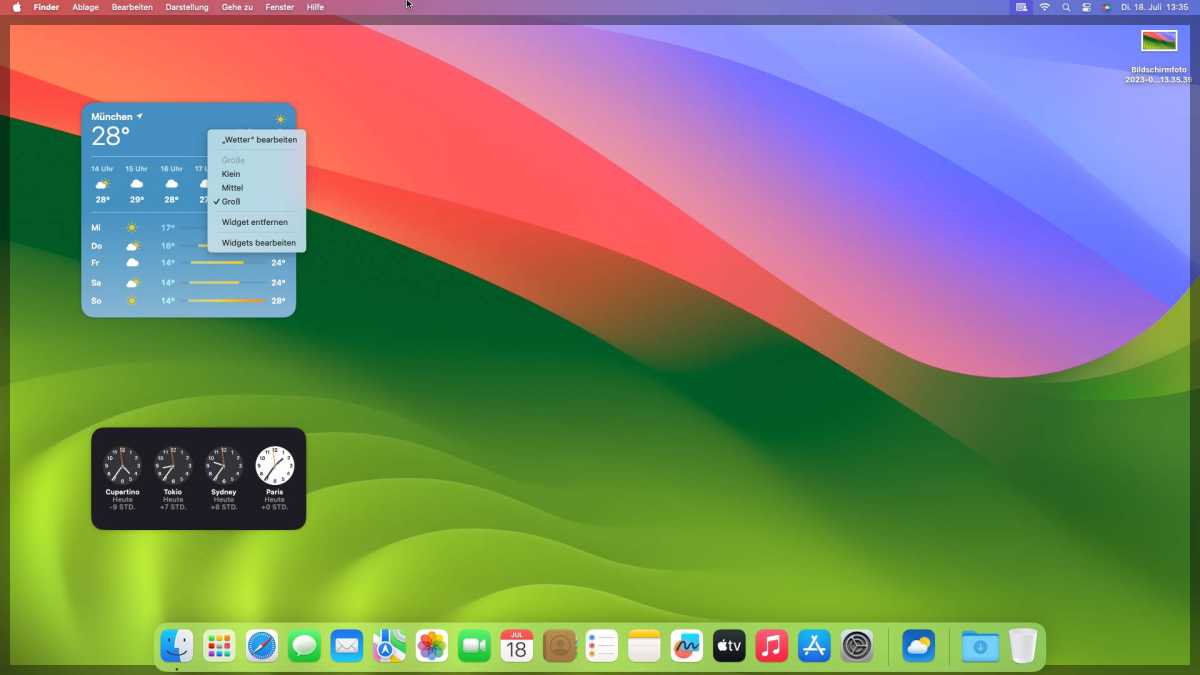Wondering which versions of macOS your Mac can run? We’ve put together a macOS compatibility checker that will show you what Macs the different versions of macOS and Mac OS X support, so you can tell what version you should be running on your Mac.
What Mac operating systems can my Mac run?
Apple releases a new version of the Mac operating system almost every year—but the new version of the Mac operating system will not support every Mac. Each year more and more Macs fall off the compatibility list and are unable to be updated to take advantage of the latest features.
The latest version, macOS 14 Sonoma, arrived on September 26. Read on to find out which Macs are supported by each version of the Mac operating system. For advice about installing Sonoma read: How to install macOS Sonoma on your Mac. To learn how to install the Sonoma beta read: How to install the macOS beta.
Can I install an older OS on my Mac?
Officially, the operating system that was available on your Mac at the time that you bought it is the oldest version of macOS that can run on that Mac. It’s likely that an older OS won’t include the necessary drivers for the hardware on your newer Mac. For this reason, it is unlikely that you will be able to install an older version of macOS on a new Mac—but you can take a look at how to install old versions of macOS or OS X for other Macs. Owners of Macs with M1 or M2 chips won’t be able to run older versions of macOS that weren’t designed for M1 Macs.
But it may not just be a case of wanting to know if your Mac can run the newest operating system. You might also want to know if it is possible to downgrade your Mac to an older version of macOS and need to know the oldest version of macOS. You’ll also find that below. You can also see a complete list of all the different versions of macOS and Mac OS X. Not sure which Mac you own? Check our article about how to identify your Mac.
Note: In each case, the year referenced below is the year that Mac was introduced–you could for example have bought a 2016 MacBook in early 2017, but it’s still the 2016 MacBook. This is important to keep in mind if you are looking to run an older version of macOS on a Mac. Macs are generally incompatible with versions of macOS that are older than the one it shipped with.
Will macOS 15 arrive in 2024?
Apple will preview macOS 15 during its annual WWDC keynote presentation on June 10. We don’t know which Macs will be compatible, but we assume some Intel Macs will be dropped, if not all of the remaining ones since it’s already been four years since the first Apple silicon Macs arrived. We expect all M-series Macs will be supported for at least another year.
macOS 14 Sonoma compatibility
macOS Sonoma
is the newest version of macOS.
IDG
macOS 14 Sonoma became available on Tuesday, September 26, 2023. The latest version, macOS 14.5, released on Monday, May 13. If you want to install the operating system update you will only be able to do so on one of these Macs:
iMac from 2019 and later
Mac Pro from 2019 and later
iMac Pro from 2017
Mac Studio from 2022 and later
MacBook Air from 2018 and later
Mac mini from 2018 and later
MacBook Pro from 2018 and later
For more information read: Can my Mac run Sonoma?
macOS 13 Ventura compatibility
Apple
Apple released macOS 13 Ventura to the public on October 24, 2022. The latest version is 13.6.7 which arrived on May 13. Read our guide to every version of macOS released to find out about the latest version. To run Ventura you will need one of these Macs:
MacBook models from 2017 or later
MacBook Air models from 2018 or later
MacBook Pro models from 2017 or later
Mac mini models from 2018 or later
iMac models from 2017 or later
iMac Pro (all models)
Mac Pro models from 2019 or later
Mac Studio (all models)
For more information read: Can my Mac run Ventura?
macOS 12 Monterey compatibility
Apple
macOS 12 Monterey was made available to download on October 15, 2021. The latest version is 12.7.5 which arrived on May 13. The following Macs are compatible with macOS Monterey:
MacBook models from early 2016 or later
MacBook Air models from early 2015 or later
MacBook Pro models from early 2015 or later
Mac mini models from 2014 or later
iMac from 2015 or later
iMac Pro (2017 and later)
Mac Pro models from late 2013 and later
Mac Studio
macOS 11 Big Sur compatibility
Apple
macOS 11 Big Sur was the version of macOS that arrived on November 12, 2020. The latest version is 11.7.10 which arrived in September 2023. Here’s a list of the Macs that can run macOS Big Sur:
MacBook models from early 2015 or later
MacBook Air models from 2013 or later
MacBook Pro models from 2013 or later
Mac mini models from 2014 or later
iMac from 2014 or later
iMac Pro (all models)
Mac Pro models from 2013 and 2019
macOS 10.15 Catalina compatibility
Catalina arrived in October 2019, and the latest version is macOS 10.15.7 with Security Update 2022-05 (which arrived in July 2022) and can run on the following Macs:
MacBook (2015 to 2017)
MacBook Air (Mid-2012 to 2019)
MacBook Pro (Mid-2012 to 2019)
Mac mini (Late 2012 to late-2018)
iMac (Late 2012 to 2019)
iMac Pro (all models)
Mac Pro models from 2013
Note that the M-series Macs will not be able to run Catalina or earlier.
macOS 10.14 Mojave compatibility
Mojave arrived in September 2018 (latest version 10.14.6) and can run on the following Macs:
MacBook (Early 2015 to 2017)
MacBook Air (Mid 2012 to 2017, because it’s the same as 2015 model)
MacBook Pro (Mid 2012 to 2018)
Mac mini (Late 2012 to late-2018)
iMac (Late 2012 to mid-2017)
iMac Pro (all models)
Mac Pro (Late 2013, plus mid-2010 and mid-2012 models with recommended Metal-capable GPU)
macOS 10.13 High Sierra compatibility
High Sierra arrived in September 2017 (latest version 10.13.6) and can run on the following Macs:
MacBook (Late 2009 to 2017)
MacBook Air (Late 2010 to 2017, which is same as 2015 model)
MacBook Pro (Mid 2010 to 2017)
Mac mini (Mid 2010 to 2014)
iMac (Late 2009 to mid-2017)
Mac Pro (Mid 2010 and 2013)
macOS 10.12 Sierra compatibility
Sierra, the first update to drop the “X” from the name, arrived in September 2016 (latest version 10.12.6) and can run on the following Macs:
MacBook (Late 2009 to 2017)
MacBook Air (Late 2010 to 2017, which is same as 2015 model)
MacBook Pro (Mid 2010 to 2015)
Mac mini (Mid 2010 to 2014)
iMac (Late 2009 to 2015)
Mac Pro (Mid 2010 and 2013)
Mac OS X 10.11 El Capitan compatibility
El Capitan arrived in September 2015 (latest version 10.11.6) and can run on the following Macs:
MacBook (Early 2015 to 2017)
MacBook (Late 2008 to 2010)
MacBook Air (Late 2008 to early 2015)
MacBook Pro (Mid/Late 2007 to early 2015)
Mac mini (Early 2009 to 2014)
iMac (Mid 2007 to mid-2015)
Mac Pro (2008, 2010, 2013)
OS X 10.10 Yosemite compatibility
Yosemite arrived in October 2014 (latest version 10.10.5) and can run on the following Macs:
MacBook (Late 2008 to 2010)
MacBook Air (Late 2008 to mid 2013)
MacBook Pro (13″ Mid-2009 to mid 2014)
MacBook Pro (15″ Mid/Late 2007 to mid 2014)
MacBook Pro (17″ Late 2007 to 2011)
Mac mini (Early 2009 to 2012)
iMac (Mid-2007 to mid-2014)
Mac Pro (2008 and 2010)
Mac OS X 10.9 Mavericks compatibility
Mavericks arrived in October 2013 (latest version 10.9.5) and can run on the following Macs:
MacBook (Late 2008 to 2010)
MacBook Air (Late 2008 to mid 2013)
MacBook Pro (Mid 2007 to early 2013)
Xserve (Early 2009)
Mac mini (Early 2009 to 2012)
iMac (Mid 2007 to early 2013)
Mac Pro (Early 2008 and 2010)
Mac OS X 10.8 Mountain Lion compatibility
Mountain Lion, the last of the “big cat” versions of the Mac operating system launched in July 2012 (latest version 10.8.5) and can run on the following Macs:
MacBook (Late 2008 to 2010)
MacBook Air (Late 2008 to mid 2012)
MacBook Pro (Mid/Late 2007 to mid-2012)
Mac mini (Early 2009 to 2011)
iMac (Mid-2007 to 2011)
Mac Pro (Early 2008 and 2010)
Wondering how long Apple will support your Mac for? Read:
How long do Macs last?
Mac, MacOS, Personal Software
Macworld
Wondering which versions of macOS your Mac can run? We’ve put together a macOS compatibility checker that will show you what Macs the different versions of macOS and Mac OS X support, so you can tell what version you should be running on your Mac.
What Mac operating systems can my Mac run?
Apple releases a new version of the Mac operating system almost every year—but the new version of the Mac operating system will not support every Mac. Each year more and more Macs fall off the compatibility list and are unable to be updated to take advantage of the latest features.
The latest version, macOS 14 Sonoma, arrived on September 26. Read on to find out which Macs are supported by each version of the Mac operating system. For advice about installing Sonoma read: How to install macOS Sonoma on your Mac. To learn how to install the Sonoma beta read: How to install the macOS beta.
Can I install an older OS on my Mac?
Officially, the operating system that was available on your Mac at the time that you bought it is the oldest version of macOS that can run on that Mac. It’s likely that an older OS won’t include the necessary drivers for the hardware on your newer Mac. For this reason, it is unlikely that you will be able to install an older version of macOS on a new Mac—but you can take a look at how to install old versions of macOS or OS X for other Macs. Owners of Macs with M1 or M2 chips won’t be able to run older versions of macOS that weren’t designed for M1 Macs.
But it may not just be a case of wanting to know if your Mac can run the newest operating system. You might also want to know if it is possible to downgrade your Mac to an older version of macOS and need to know the oldest version of macOS. You’ll also find that below. You can also see a complete list of all the different versions of macOS and Mac OS X. Not sure which Mac you own? Check our article about how to identify your Mac.
Note: In each case, the year referenced below is the year that Mac was introduced–you could for example have bought a 2016 MacBook in early 2017, but it’s still the 2016 MacBook. This is important to keep in mind if you are looking to run an older version of macOS on a Mac. Macs are generally incompatible with versions of macOS that are older than the one it shipped with.
Will macOS 15 arrive in 2024?
Apple will preview macOS 15 during its annual WWDC keynote presentation on June 10. We don’t know which Macs will be compatible, but we assume some Intel Macs will be dropped, if not all of the remaining ones since it’s already been four years since the first Apple silicon Macs arrived. We expect all M-series Macs will be supported for at least another year.
macOS 14 Sonoma compatibility
macOS Sonoma is the newest version of macOS.
macOS Sonoma is the newest version of macOS. IDG
macOS Sonoma is the newest version of macOS. IDG
IDG
macOS 14 Sonoma became available on Tuesday, September 26, 2023. The latest version, macOS 14.5, released on Monday, May 13. If you want to install the operating system update you will only be able to do so on one of these Macs:
iMac from 2019 and later
Mac Pro from 2019 and later
iMac Pro from 2017
Mac Studio from 2022 and later
MacBook Air from 2018 and later
Mac mini from 2018 and later
MacBook Pro from 2018 and later
For more information read: Can my Mac run Sonoma?
macOS 13 Ventura compatibility
Apple
Apple
Apple
Apple released macOS 13 Ventura to the public on October 24, 2022. The latest version is 13.6.7 which arrived on May 13. Read our guide to every version of macOS released to find out about the latest version. To run Ventura you will need one of these Macs:
MacBook models from 2017 or later
MacBook Air models from 2018 or later
MacBook Pro models from 2017 or later
Mac mini models from 2018 or later
iMac models from 2017 or later
iMac Pro (all models)
Mac Pro models from 2019 or later
Mac Studio (all models)
For more information read: Can my Mac run Ventura?
macOS 12 Monterey compatibility
Apple
Apple
Apple
macOS 12 Monterey was made available to download on October 15, 2021. The latest version is 12.7.5 which arrived on May 13. The following Macs are compatible with macOS Monterey:
MacBook models from early 2016 or later
MacBook Air models from early 2015 or later
MacBook Pro models from early 2015 or later
Mac mini models from 2014 or later
iMac from 2015 or later
iMac Pro (2017 and later)
Mac Pro models from late 2013 and later
Mac Studio
macOS 11 Big Sur compatibility
Apple
Apple
Apple
macOS 11 Big Sur was the version of macOS that arrived on November 12, 2020. The latest version is 11.7.10 which arrived in September 2023. Here’s a list of the Macs that can run macOS Big Sur:
MacBook models from early 2015 or later
MacBook Air models from 2013 or later
MacBook Pro models from 2013 or later
Mac mini models from 2014 or later
iMac from 2014 or later
iMac Pro (all models)
Mac Pro models from 2013 and 2019
macOS 10.15 Catalina compatibility
Catalina arrived in October 2019, and the latest version is macOS 10.15.7 with Security Update 2022-05 (which arrived in July 2022) and can run on the following Macs:
MacBook (2015 to 2017)
MacBook Air (Mid-2012 to 2019)
MacBook Pro (Mid-2012 to 2019)
Mac mini (Late 2012 to late-2018)
iMac (Late 2012 to 2019)
iMac Pro (all models)
Mac Pro models from 2013
Note that the M-series Macs will not be able to run Catalina or earlier.
An M-series (Apple Silicon) Mac cannot be downgraded beyond Big Sur.
An M-series (Apple Silicon) Mac cannot be downgraded beyond Big Sur.
An M-series (Apple Silicon) Mac cannot be downgraded beyond Big Sur.
macOS 10.14 Mojave compatibility
Mojave arrived in September 2018 (latest version 10.14.6) and can run on the following Macs:
MacBook (Early 2015 to 2017)
MacBook Air (Mid 2012 to 2017, because it’s the same as 2015 model)
MacBook Pro (Mid 2012 to 2018)
Mac mini (Late 2012 to late-2018)
iMac (Late 2012 to mid-2017)
iMac Pro (all models)
Mac Pro (Late 2013, plus mid-2010 and mid-2012 models with recommended Metal-capable GPU)
macOS 10.13 High Sierra compatibility
High Sierra arrived in September 2017 (latest version 10.13.6) and can run on the following Macs:
MacBook (Late 2009 to 2017)
MacBook Air (Late 2010 to 2017, which is same as 2015 model)
MacBook Pro (Mid 2010 to 2017)
Mac mini (Mid 2010 to 2014)
iMac (Late 2009 to mid-2017)
Mac Pro (Mid 2010 and 2013)
macOS 10.12 Sierra compatibility
Sierra, the first update to drop the “X” from the name, arrived in September 2016 (latest version 10.12.6) and can run on the following Macs:
MacBook (Late 2009 to 2017)
MacBook Air (Late 2010 to 2017, which is same as 2015 model)
MacBook Pro (Mid 2010 to 2015)
Mac mini (Mid 2010 to 2014)
iMac (Late 2009 to 2015)
Mac Pro (Mid 2010 and 2013)
Mac OS X 10.11 El Capitan compatibility
El Capitan arrived in September 2015 (latest version 10.11.6) and can run on the following Macs:
MacBook (Early 2015 to 2017)
MacBook (Late 2008 to 2010)
MacBook Air (Late 2008 to early 2015)
MacBook Pro (Mid/Late 2007 to early 2015)
Mac mini (Early 2009 to 2014)
iMac (Mid 2007 to mid-2015)
Mac Pro (2008, 2010, 2013)
OS X 10.10 Yosemite compatibility
Yosemite arrived in October 2014 (latest version 10.10.5) and can run on the following Macs:
MacBook (Late 2008 to 2010)
MacBook Air (Late 2008 to mid 2013)
MacBook Pro (13″ Mid-2009 to mid 2014)
MacBook Pro (15″ Mid/Late 2007 to mid 2014)
MacBook Pro (17″ Late 2007 to 2011)
Mac mini (Early 2009 to 2012)
iMac (Mid-2007 to mid-2014)
Mac Pro (2008 and 2010)
Mac OS X 10.9 Mavericks compatibility
Mavericks arrived in October 2013 (latest version 10.9.5) and can run on the following Macs:
MacBook (Late 2008 to 2010)
MacBook Air (Late 2008 to mid 2013)
MacBook Pro (Mid 2007 to early 2013)
Xserve (Early 2009)
Mac mini (Early 2009 to 2012)
iMac (Mid 2007 to early 2013)
Mac Pro (Early 2008 and 2010)
Mac OS X 10.8 Mountain Lion compatibility
Mountain Lion, the last of the “big cat” versions of the Mac operating system launched in July 2012 (latest version 10.8.5) and can run on the following Macs:
MacBook (Late 2008 to 2010)
MacBook Air (Late 2008 to mid 2012)
MacBook Pro (Mid/Late 2007 to mid-2012)
Mac mini (Early 2009 to 2011)
iMac (Mid-2007 to 2011)
Mac Pro (Early 2008 and 2010)
Wondering how long Apple will support your Mac for? Read:
How long do Macs last?
Mac, MacOS, Personal Software Macworld










